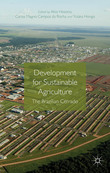Development for Sustainable Agriculture: The Brazilian Cerrado

Brazil is one of the world's major grain producers today. It was even the world's largest exporter of soybeans in 2011.
However, Brazil was a net importer of grain until the 1980s when the country achieved a major break-through after turning a vast tropical savanna region, the Cerrado, into some of the world's most productive agricultural fields. For the first time in human history, grain farming in a tropical region was realized with high productivity on previously barren land.
The book aims to reveal the major factors in this agricultural development, often hailed as "the Cerrado miracle," by analyzing it as a process of establishing and developing a new industry, in which an extensive and diversified agro-industry value chain was developed, generating competitive value-added exports such as meat and expanding employment opportunities and regional development.
The book says the Cerrado agriculture can be regarded as a model for sustainable development not only because it has generated food production, agro-industry value chains, and employment opportunities, but also because it has incorporated environmental considerations by the application of technological and institutional innovations.
"The Cerrado development could therefore provide a valuable model for contemporary developing countries struggling to attain nutrition and food security, to create value chains and jobs, to generate socially inclusive growth, and to achieve sustainable development," write the editors in the introduction.
The book was edited by Akio Hosono, JICA-RI senior research advisor, Carlos Magno Campos da Rocha, former President of the Brazilian Agricultural Research Corporation (EMBRAPA) and Yutaka Hongo, former JICA senior adviser.
The chapters in Part I "Develpment of Cerrado Agriculture" include "Development of Cerrado Agriculture: The Path to Becoming a Major Global Breadbasket" and "The Impact of Cerrado Development: Stable Food Supply and Socially Inclusive Development with Value Chains" written by Hosono and Hongo. Part I first explains how agriculture in the Cerrado was made possible. It then analyzes the progress of socially inclusive development brought about by Cerrado agriculture. Finally, agriculture in the Cerrado region is discussed from the perspective of sustainable development.
Carlos Magno and other Brazilian researchers and practitioners each wrote the chapters in Part II "Technological and Institutional Innovations that Enabled Sustainable Cerrado Agriculture." It goes on to discuss the critical roles played by Brazilian institutions and programs in the successful development of Cerrado agriculture.
The book's forewords were written by Akihiko Tanaka, former President of JICA and Alysson Paulinelli, former Minister of Agriculture, Brazil.
scroll